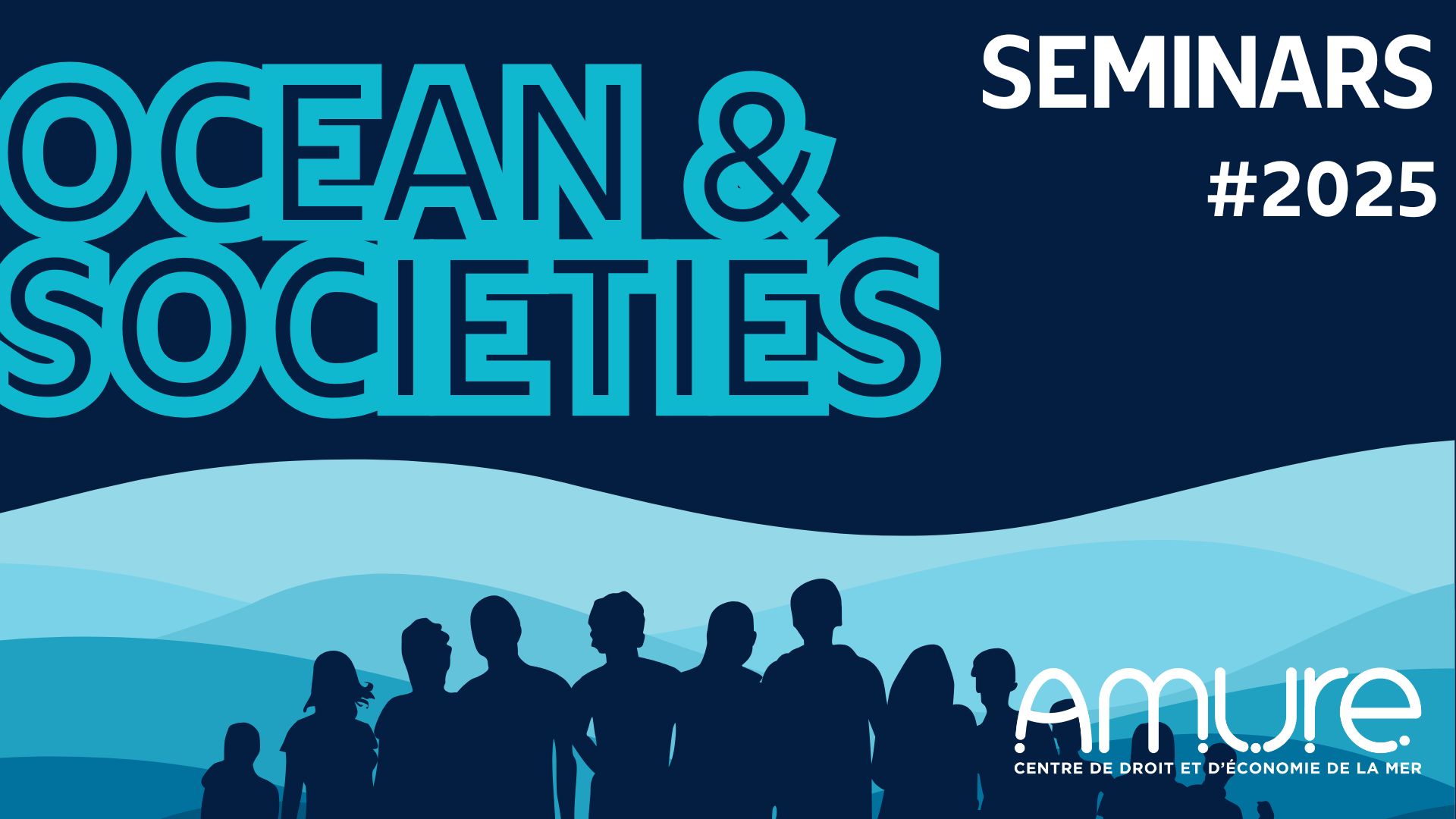Presentation
The ‘Ocean and Societies’ seminar, organised and run by AMURE’s scientific team, is aimed at anyone interested in contemporary changes in the relationship between human societies and the marine environments they use, exploit, degrade and/or protect. Its aim is to bring together and present the most recent contributions of the social sciences to an understanding of the issues and processes involved in the socialisation of the ocean, whether in terms of the production and implementation of legal standards, negotiated professional regulations, public policies and management of commons, the mobilisation of civil society or the place occupied by the sea in people’s lived experience.
The seminar programme is designed to encourage the expression and active participation of all the teams, scientific fields and areas that feed into AMURE’s research and partnerships. It offers next opportunities to engage with interdisciplinary dialogue, be it in sustainability sciences and environmental humanities, at the level of the European University Institute of the Sea.
.
SEASON #1
Season 1 of the seminar (January-June 2025) will first address major contributions of legal and economic sciences to the sciences of sustainability. We will look at valuing ecosystem services with Andrew Sheld (Virginia Marine Institute of Technology), the role of international jurisdictions in the fight against climate change with Ida Caracciolo (International Tribunal for the Law of the Sea) and economic dimensions of the transition to sufficiency with Katheline Shubert (Paris 1-Panthéon-Sorbonne et École d’Économie de Paris). In the following three sessions, we will focus on the localised transformations of societies confronted with the events and disturbances associated with anthropogenic environmental change in coastal zones. We will address ‘natural’ disasters and their effects on local public action with Sonia Paty (University of Lyon), and socio-economic changes brought about by exposure to coastal risks with Rebecca Elliott (London School of Economics).
PROGRAM
Seminar Ocean & Societies #2
february 27, 2025, Amphi D and online, 13h>14h30
The ITLOS Advisory Opinion on Obligations Related to Climate Change under the United Nations Convention on the Law of the Sea
Mme la Juge Ida Caracciolo, Judge Ida Caracciolo, Member of the International Tribunal for the Law of the Sea
Judge Ida Caracciolo has been a Member of the International Tribunal for the Law of the Sea since October 1, 2020. She has been a Professor of International Law at the University of Campania “Luigi Vanvitelli” since 2005 and has authored numerous publications in Italian, English, and French on public international law, the law of the sea, and international human rights law. She has led or participated in several research projects on international law and the law of the sea, funded notably by the Italian National Research Council (since 1989), and has been a visiting professor at various foreign universities.
Abstract : Judge Ida Caracciolo will present the advisory opinion delivered by the ITLOS on May 21, 2024. The request, submitted by the Commission of Small Island States on Climate Change and International Law, concerned the obligations of States Parties to the United Nations Convention on the Law of the Sea (UNCLOS) to, on the one hand, prevent, reduce, and control marine pollution resulting from anthropogenic greenhouse gas emissions, and on the other hand, protect and preserve the marine environment in the face of climate change impacts. ITLOS unanimously recognized its jurisdiction over the case. Considering that anthropogenic GHG emissions indeed constitute marine pollution, the Tribunal, through this opinion, clarified the obligations of States Parties to UNCLOS regarding climate change—an issue also being addressed in advisory opinion requests before other international courts (ICJ, IACtHR).
- Introduction of seminar : Alix Thines, PhD Student in Public International Law, AMURE/UBO et CEDIM/Université Paris Nanterre
Séminaire Océan & Sociétés #1
January 30, 2025, Amphi D and online, 12h>13h30
Valuing ecosystem services provided by tidal marshes in Virginia, US,
By Andrew Scheld, Resource Economics, University of Massachusetts, Amherst
Dr. Andrew M. Scheld is the Moses D. Nunnally Associate Professor of Marine Science at the Virginia Institute of Marine Science, William & Mary. He is a resource economist whose research focuses on fisheries, aquaculture, and coastal management, with current areas of active research including: offshore wind energy and fisheries interactions, impacts and acceptance of nearshore aquaculture expansion, and valuation of coastal natural capital.
Abstract: Marshes are important natural capital assets for many coastal communities, providing a range of ecosystem services such coastal protection and erosion control, nutrient removal and water purification, fish habitat, and recreational opportunities. This research explored the economic value of tidal marsh services for coastal communities in Virginia, US using multiple methods. First, a benefit transfer analysis was conducted using literature-derived values (n = 119 studies reviewed) adjusted for site-specific conditions. Then, two stated preference surveys were developed and implemented, one targeting recreational users and the other targeting individuals engaged in shoreline management decision-making. Survey responses were modeled in a random utility framework and used to assess ecosystem service values as well as tradeoffs in shoreline management decisions. The total value of ecosystem services provided by marsh habitats considered in this analysis was estimated at US ~$40M-90M per year, or 1.5-3.4% of annual gross domestic product for the study region. Valuing marsh ecosystem services can improve social efficiency in shoreline management decisions while also advancing natural capital accounting.
- Chairman de ce séminaire : Max Régis Ogounchi, doctorant Amure, qui introduira le Dr. Andrew Scheld.
The ‘Ocean and Societies’ seminar will be held every last Thursday of the month, in Amphi D, from 1pm to 2.30pm
Registration
Scientific coordination :
- Alix Levain, CNRS/AMURE
- Marie-Estelle Binet, UBO/AMURE
- Marie Guimezanes, UBO/AMURE


